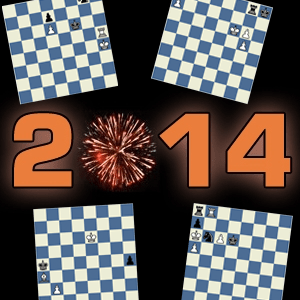
Welcome to 2014
As we ring in 2014, I will show some beautiful endgame studies. Maybe you are recovering from your New Year's celebrations, perhaps getting ready to go back to work. But regardless, please enjoy these "etudes" which show the sublime and mystical events which can happen in seemingly normal positions. Maybe something like this will happen in one of your games in 2014? Who knows!
In the first one, a study by Yochanan Afek from 1983, White is down a rook and his pawn storm seems futile. But it does allow his king to escape to the corner!
Ultimately space travel will become crucial since it might be the only way to save the human race. This 1961 study by E. Pogosyants shows the benefits that this extra space would provide.
Multi-tasking is important in 2014, although Richard Réti invented that idea long ago...
This confusing position quickly simplifies down to a basic one, but what imagination it must have taken to invent it! The single pawn beats the rook and pawn.
The final position is a very famous one that you might have already seen. So feel free to skip it if you have. But every chess player should know this one, which is why I am putting it here. These "little ones" (positions with just the kings and two or three pieces) seem like they should be so basic - uninteresting, easily solved, and holding no surprises. But in fact there is a practically infinite (from the human perspective, at least) variety of permutations of just a few pieces, and even these few pieces can create magic.
The origins of this position, like many endgame positions from relatively distant history, are mysterious. From what I have read, it was an inaccurately-remembered position from a local game in England, 1895, which was published in a newspaper by a columnist named Barbier. It was written that the position was a draw, based on the stalemate resource 6...Rc4+. But then a Spanish monk named Saavedra pointed out the win by underpromotion.
Sadly, in the year 2014 it wouldn't happen that way. Somebody who quite possibly could have a shaky knowledge of the rules of chess could point out the unusual win in less than a second using whatever chess engine they preferred. The truth would be reached much faster, but the journey would be lost, and the journey is really the whole point.
RELATED STUDY MATERIAL
- Read WIM Iryna Zenyuk's article Time for Fireworks in the Endgame;
- Watch GM Josh Friedel's video Endgame Technique: Zugzwang;
- Do the Chess Mentor Underpromotion.






